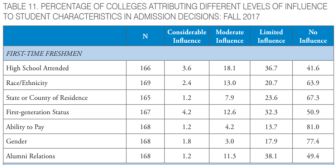Colleges and universities are under increasing pressure to downgrade the importance that ACT and SAT scores play when they evaluate students for admission. A new report suggests they’re responding to that pressure.
A recently released survey of college admissions officials shows a significant increase in their skepticism about the value of national admissions tests.
Admissions officers were asked to rate the relative importance of various parts of students’ records, such as the courses they took, their class rank, counselors’ recommendations and test scores. In the past two years, there’s been a five-point drop in the percentage of institutions that assign a good deal of weight to ACT or SAT test scores incoming freshmen.

The newest round of . The organization surveys its members—high school counselors and college admissions officers—annually to gauge trends in college admission.
A similar dynamic emerged on the importance of students’ state graduation-exam scores. In 2016, 14.5 percent of the institutions said they assigned moderate or considerable importance to those test scores. By this year, only 10.1 percent gave that answer.
The decline in the importance of SAT and ACT scores dovetails with the trend of making ACT or SAT scores optional when a student applies to college. The National Center for Fair and Open Testing, which opposes high-stakes standardized tests, has been keeping a . That list has grown to more than 1,000.
Those who favor such policies put a pretty big feather in their caps earlier this year, when the .” They predicted that the move by such an influential university would encourage others to do the same.
The NACAC survey offered an intriguing look, also, at the relative importance that various personal traits about students play in the admissions process. Among the seven characteristics NACAC asked the admissions officers about, first-generation status tops the list of those that wield “considerable importance” in admissions.
First-generation status outranked other personal factors that many assume play powerful roles in admission, such as whether an applicant can afford the college’s sticker price, or has a close relative who’s one of its alumni.

Interestingly, nearly two-thirds of the institutions reported that a student’s race or ethnicity plays no role in admission, and nearly half said alumni considerations played no role, either.
